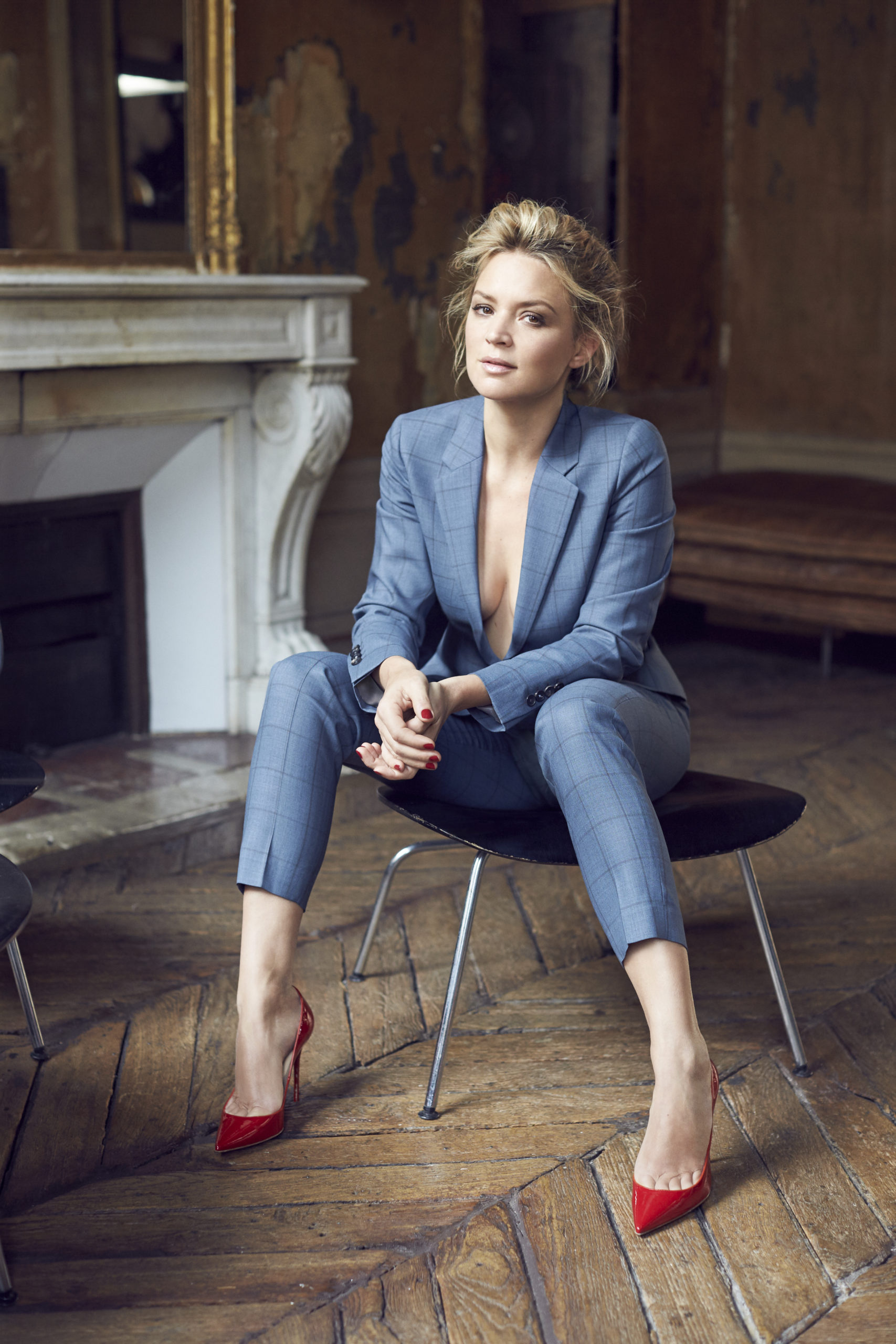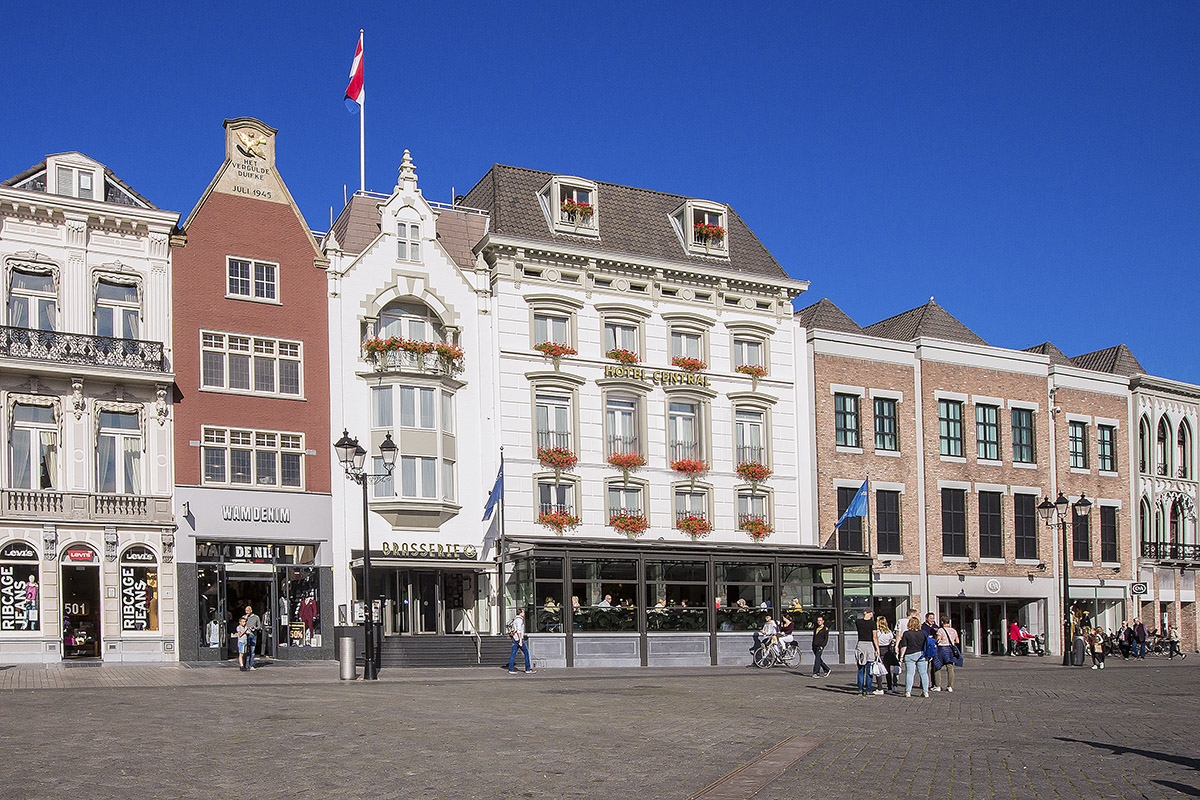Virginie Efira: A complex comedy queen

For a long time, Virginie Efira was referred to as a presenter-turned-actress thanks to her origins as a TV host in her native Belgium, as well as on France’s Canal+ network. But it is fair to say 2016 has been the year she has left all that behind to secure her place as the darling of French cinema. She received rave reviews for her leading roles in two of the summer’s biggest romantic comedies: In Bed with Victoria, which kicked off Critics’ Week at the Cannes Film Festival in May, and Up for Love alongside Oscar winner Jean Dujardin. As her 40th birthday approaches, we caught up with the comedy queen who revealed a surprisingly serious side.
In Laurent Tirard’s Up for Love, Efira plays lawyer and divorcee Diane, who finds herself challenging her own prejudices when she falls for Alexandre (played by Dujardin), a man who is less than five feet tall. “Being ashamed of someone you love, the idea to me was both pathetic and very funny,” explains Efira, who has a young daughter with her partner, the director Mabrouk el Mechri. “When I read the script it sounded more reasonable to me,” she explains. “What I really liked about the film is that it says ‘of course there are horrible things in today’s world, but it is for us to choose to not be a part of them’. “We can choose our own paths of resistance. Worrying about appearances is normal, but to what extent?”
Looks can be deceiving
Does the beautiful Efira, who frequently graces the covers of glossy women’s magazines, ever worry about how she looks? Not a fan of social media herself, she admits that in today’s connected society, it can be hard to not get swept up in the quest for physical perfection. “It’s not very easy when the world of advertising rules, telling us to remain youthful, to lose weight because it’s summer,” she begins. “It is society as a whole. Since the dawn of time people have been concerned about their appearance. That seems logical to me. But now in our era of Twitter and social networks, people’s narcissism is highlighted. You know, ’oh look at my super flat stomach’. “I don’t think people nowadays are more conceited, but we have more ways of displaying our vanity. Even I tell myself how awful all of this is, but at times I surprise myself by saying ‘oh I need to lose weight or ‘oh no, I have a wrinkle’. “But I tell myself that before saying society is terrible, look at yourself and realise you do not have to be a victim. You can keep your distance from that kind of thing.” Efira was attracted to Up for Love not only for the opportunity to work with Dujardin, but also because she had long been a fan of director Tirard, whose credits include Little Nicholas (2009), Molière (2007) and Astérix and Obélix: God Save Britannia (2012). “He directs comedies which have style and are thought provoking,” explains Efira. It was also the chance to play a complex female role that appealed to her. “I found Diane appealing, it is her that carries the film. We follow her reasoning, the way she can be stuck in her conventional views. It wasn’t just a token female role.”
Stopping stereotypes
It is her decision to steer clear of clichéd female parts that has driven many of Efira’s film choices. It is also one of the reasons you will not see her heading for the Hollywood hills anytime soon. “I’m happy to be in Europe and have the system that allows France to make very different films and to be able to portray different versions of a woman,” she asserts. “I think the representation of women [in Hollywood] can be quite simplified. Youth is worshipped and there is an image of the female accompanying the man, either as the mother or the sex object.” Does Efira has a dream role, a woman whose story she would really love to tell? “I often read books and I think ‘I would really like to play this woman’, but it is not at all well-known people,” she starts. She then considers the German-born Jew and political theorist Hannah Arendt, who escaped Europe during the Holocaust. “I find her fascinating – but I look nothing like her.”
Showing her serious side
Efira’s choice of Hannah Arendt is an interesting one. It certainly challenges any misconceptions about the reality
TV presenter turned comedy actress. She admits herself that people might initially associate her with more lighthearted roles. “In fact, as I started in television we did really funny things. I have chubby cheeks, I’m quite comical,” she concedes, before explaining that she sometimes finds comedy is not challenging enough. “I love comedy, but what I really love is when comedies manage to not be too conventional. In France, conventional comedies are the ones which are easiest to receive funding for, and are the ones which people go to watch the most. It’s a shame because in those types of films the characters are less complex.” Complexity is something that In Bed with Victoria certainly does not lack. Efira plays the title character, a sharp and cynical 30-something divorcee raising her two daughters. Efira was attracted to the Justine Triet directed film thanks to its
dark side, which is in the vein of English comedies. “There is humour, but the character is also extremely melancholy sometimes. There are individuals. That is what English comedy does very well. There aren’t prototype characters. You can laugh at things that are really dark.”
Making a melodrama
With her excellent comic timing, there is no chance of Efira ever turning her back on her comedic roots. But she is keen to branch out, and argues that diversity is key to a successful career. “I am only just starting to make more dramatic films but I love that. As an actor, it is good to play different types of parts,” she asserts, adding that there is one genre in particular she is keen to try. “I would love to star in a melodrama, I have never done that. Getting fully immersed in a character’s feelings is something that I find appealing.” When asked how she feels about the
large numbers of remakes and prequels/sequels dominating the box office these days, she says the trend does not sit well with her. Although there are parts she has always dreamt of playing, she sees no point in reviving movies for the sake of it. “I struggle with the idea of remakes, which to me seems to represent a lack of ideas. Sometimes it is worthwhile to tell a story in another way, but if it is just to say ‘that worked, so maybe the people who saw this film the first time can go and see it with their children’ – meh. I don’t really see the point,” she says. “When I was 12 years old, if someone said to me ‘you can star in a remake of Dirty Dancing’ I would have said ‘sure’. But that would have been my fantasy as a 12-year-old. There are films that I found wonderful and I have no desire to see them remade.”
Behind the camera
Efira is very keen to stress that despite being one of her country’s greatest cinematic exports, she is wary of heralding herself as a Belgian icon. “I do not say I represent Belgium. I do not feel this way…” she explains. That being said, she is extremely proud of her nation’s film legacy and provides a long list of Belgian directors that she is longing to work with. “I really like Bouli Lanners, Joachim Lafosse, Michaël R. Roskam. Definitely the Dardenne brothers [Jean-Pierre and Luc]. ” Finally, we wondered whether Efira, who has already turned her hand to writing and has a co-writing credit on the 2013 romantic comedy It Boy, would ever consider getting behind the camera herself? “Not necessarily at this stage,” she thinks. “Maybe when I’m 60 years old. But we’re not there yet…”
TEXT: ANNA VILLELEGER | PHOTO: FRED MEYLAN
Subscribe to Our Newsletter
Receive our monthly newsletter by email




